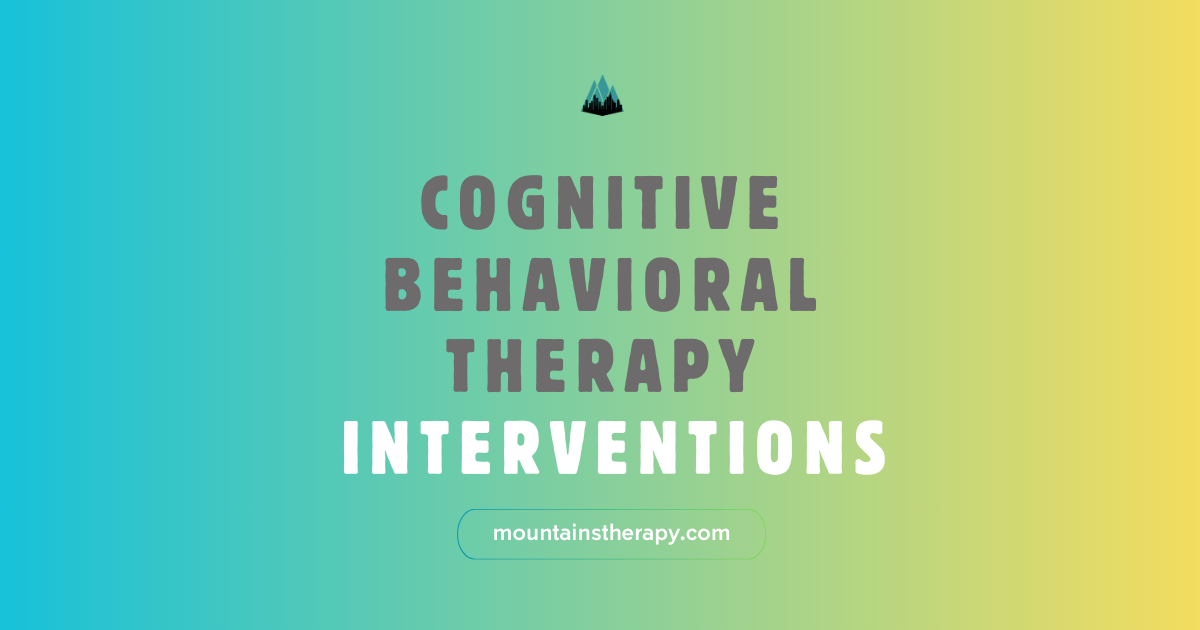Power of Cognitive-Behavioral Therapy: Your Guide to Effective Interventions
Learn more about Cognitive-Behavioral Therapy for Adults.
In This Blog, You’ll Learn:
- What Cognitive Behavioral Therapy (CBT) is and core principles
- How CBT Helps Manage Mental Health Conditions
- Cognitive Interventions for Anxiety, Depression, and Stress
- Techniques to Challenge Negative Thoughts
- Strategies for Managing Intrusive Thoughts
- Behavioral Activation and Exposure Therapy
- Personalized CBT for Long-Term Well-Being
What is CBT? Core Principles of CBT
At its core, Cognitive-Behavioral Therapy operates on the principle that our thoughts, emotions, and behaviors are interconnected. By identifying and challenging negative thoughts, CBT interventions help individuals cultivate healthier cognitive patterns, leading to positive changes in emotions and behaviors. Cognitive restructuring techniques assist in replacing harmful thought patterns with constructive ones, allowing for emotional and behavioral improvements. Therapists use CBT for Anxiety, CBT for Depression, CBT for Relationships, CBT for Stress, CBT for OCD, CBT for PTSD, CBT for Trauma and more.
What Are Common Cognitive Distortions?
Cognitive distortions are irrational thought patterns that negatively influence emotions and behaviors. Here are some common ones:
- All-or-Nothing Thinking – Viewing situations in black-and-white terms without considering middle ground.
- Overgeneralization – Making broad conclusions based on a single event or limited experience.
- Mental Filtering – Focusing only on negative aspects while ignoring positive ones.
- Discounting the Positive – Dismissing positive experiences as insignificant.
- Catastrophizing – Expecting the worst possible outcome in every situation.
- Personalization – Taking excessive personal responsibility for external events.
- Emotional Reasoning – Believing something is true based solely on emotional reactions.
- Should Statements – Holding rigid rules for how things "should" or "must" be.
- Labeling – Assigning harsh, generalized labels to oneself or others.
- Mind Reading – Assuming you know what others are thinking without evidence.
- Fortune Telling – Predicting future outcomes negatively without factual basis.
Key CBT Interventions
1. Cognitive Restructuring
Cognitive Restructuring This intervention involves identifying and challenging negative thoughts and distorted beliefs, replacing them with more balanced and realistic perspectives. Through guided questioning and cognitive interventions, clients learn to reevaluate their beliefs and interpretations of situations. Cognitive distortions such as catastrophizing or overgeneralization are directly addressed to foster healthier thinking patterns
Cognitive Restructuring Key Points
- Identifies and challenges negative thoughts and distorted beliefs.
- Uses guided questioning and cognitive interventions to reshape unhealthy thinking patterns.
- Targets cognitive distortions such as catastrophizing, overgeneralization, and personalization.
- Enhances self-awareness and emotional resilience by replacing unhelpful thoughts with rational perspectives.
- Particularly beneficial for anxiety, depression, and stress management.
2. Behavioral Activation
In Behavioral Activation, clients learn to identify and modify behaviors that contribute to negative emotions or avoidance. By scheduling pleasurable and meaningful activities, clients can increase their engagement in life, enhance mood, and break the cycle of depression or anxiety. This is a key strategy in CBT treatment interventions aimed at reducing avoidance behaviors and improving motivation.
Behavioral Activation Key Points
- Helps individuals recognize and change behaviors contributing to negative emotions.
- Encourages engagement in meaningful and pleasurable activities to boost mood.
- Reduces avoidance behaviors and inactivity common in depression and anxiety.
- Reinforces positive reinforcement and habit-building for long-term motivation.
- Enhances daily functioning and self-efficacy.
3. Exposure Therapy
Exposure Therapy is particularly effective for treating anxiety disorders. By gradually exposing clients to feared situations or stimuli in a controlled manner, therapists help them confront and overcome their fears, leading to a reduction in anxiety and avoidance behaviors. This technique is crucial for those struggling with how to deal with intrusive thoughts and breaking the cycle of fear-based avoidance. Systematic desensitization and gradual exposure techniques further enhance resilience in clients.
Exposure Therapy Key Points
- Gradual, controlled exposure to feared situations or thoughts to reduce anxiety.
- Essential for overcoming phobias, OCD, PTSD, and panic disorders.
- Uses systematic desensitization and response prevention techniques.
- Helps break fear-avoidance cycles by building tolerance to distressing thoughts.
- Supports individuals in dealing with intrusive thoughts and reducing compulsions.
4. Problem-Solving Skills
CBT interventions equip clients with practical problem-solving skills to effectively address life stressors and challenges. Through structured cognitive interventions, clients learn to identify goals, generate solutions, evaluate their effectiveness, and implement action plans. Decision-making strategies and cognitive flexibility training help individuals develop resilience in tackling everyday challenges.
Problem-Solving Skills Key Points
- Develops practical strategies to tackle life stressors and challenges.
- Uses structured cognitive interventions to break down complex issues.
- Enhances decision-making skills and cognitive flexibility.
- Fosters resilience by teaching step-by-step problem-resolution methods.
- Encourages individuals to evaluate and refine their approaches to stress management.
CBT Integration and Personalization
While CBT treatment interventions offer structured frameworks, they are highly adaptable and personalized to each individual's unique needs and circumstances. Therapists collaborate with clients to tailor interventions to their specific goals, preferences, and strengths, fostering a sense of ownership and empowerment in the therapeutic process. Mindfulness-based CBT techniques may also be integrated to enhance emotional regulation and self-awareness.
Unlocking the Potential of CBT
Cognitive-Behavioral Therapy interventions hold immense potential for promoting positive change, resilience, and well-being. Whether you're struggling with anxiety, depression, relationship issues, or simply seeking personal growth, CBT offers a roadmap for transformation. Cognitive restructuring, behavioral experiments, and self-monitoring techniques further support long-term emotional well-being. If you're ready to embark on a journey of self-discovery and empowerment, we invite you to explore the possibilities of Cognitive-Behavioral Therapy with a skilled therapist. Together, we can unlock your innate potential, challenge negative thoughts, and pave the way for a brighter, more fulfilling future.
Start CBT Therapy
If you're interested in learning more about CBT interventions or working with a therapist skilled in Cognitive-Behavioral Therapy, reach out to Mountains Therapy NJ today. Our team is here to help you take the next step toward emotional wellness and personal growth! Start your journey to better mental health today with evidence-based Cognitive Behavioral Therapy techniques!











